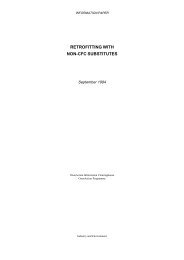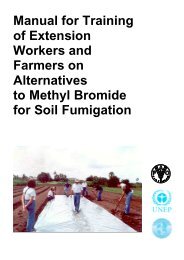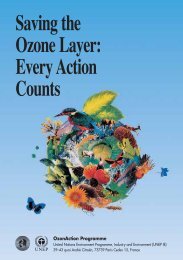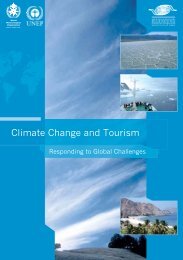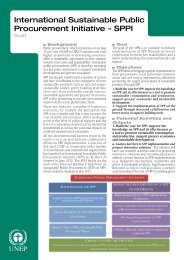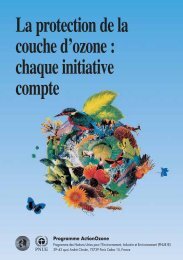Mining and Sustainable Development II - DTIE
Mining and Sustainable Development II - DTIE
Mining and Sustainable Development II - DTIE
You also want an ePaper? Increase the reach of your titles
YUMPU automatically turns print PDFs into web optimized ePapers that Google loves.
<strong>Mining</strong><br />
If you give you must always expect<br />
twice in return – a South African’s<br />
experience in Canada<br />
Grant Mitchell, Senior Policy Analyst, Minerals <strong>and</strong> Energy Policy Centre, P.O. Box 395, Wits 2050, South Africa<br />
I<br />
’m one of a party of about twenty-five people,<br />
on a traditional Indian canoe paddling off the<br />
Isl<strong>and</strong> of Vancouver in the Pacific ocean. It’s getting<br />
dark <strong>and</strong> the temperature has dropped to<br />
below zero at water level <strong>and</strong> it is only the rhythmic<br />
paddling that keeps us from freezing up.<br />
At the helm, just visible in the dark, is a native<br />
North American – or First Nations as they prefer<br />
to be called – who is slowly beating a drum <strong>and</strong><br />
singing in an ancient chant. The water rushes past<br />
the gunwales <strong>and</strong> one feels the power <strong>and</strong> stability<br />
of the canoe as it surges towards a dark shape<br />
on the horizon, an isl<strong>and</strong> some kilometres off.<br />
This is not some tourist Eco-tour or a scene<br />
from a movie set but a collection of First Nations<br />
people from the local village who, together with<br />
us – researchers from the Minerals <strong>and</strong> Energy<br />
Policy Centre in Johannesburg – make up this<br />
strange modern day Indian raiding party. The<br />
purpose of our visit is to study how the First<br />
Nations people are dealing with issues such as l<strong>and</strong><br />
restitution claims, mineral rights <strong>and</strong> the continual<br />
shifting boundaries between what constitute<br />
their traditional rights <strong>and</strong> the rights of the<br />
provinces <strong>and</strong> the state.<br />
The mythology of the North American Indians,<br />
the First Nations, is deeply entrenched in the<br />
psyche of North America. Whilst they have been<br />
marginalised <strong>and</strong> their culture all but destroyed by<br />
the North American settlers, the mythology<br />
around them still exerts a powerful fascination<br />
over American <strong>and</strong> Canadian whites. Off-road<br />
vehicles are given traditional names such as<br />
Cherokee whilst mainstream advertising has capitalised<br />
on the myth of the pure native American<br />
way of life before it was buried under centuries of<br />
colonisation. The irony is that hardly any whites<br />
have entered a First Nations reserve <strong>and</strong> knowledge<br />
of their culture <strong>and</strong> traditions has only been<br />
preserved by oral history. But they are attempting<br />
to restore their identity <strong>and</strong> to tackle the enormous<br />
problems of alcoholism, drug abuse <strong>and</strong><br />
family disintegration which have resulted from<br />
the fragmentation of their traditional way of life.<br />
The man paddling in front of me is called Dave<br />
Cole. He is a Mohawk <strong>and</strong> a community activist.<br />
He’s been brought in to tackle some of the social<br />
issues confronting the Kwakiutl community in<br />
Port Hardy, where we are being hosted. After we<br />
reach shore many hours later he expounds on the<br />
issues facing the community. “The fault lies in the<br />
past policies,” he says in his North American<br />
62 ◆ UNEP Industry <strong>and</strong> Environment – Special issue 2000<br />
drawl. “Up until the sixties we were not allowed<br />
to speak our own language, or practise our customs<br />
or religion. To reconstruct our history is<br />
going to be an enormous task.” All around the village<br />
there is evidence of economic hardship. The<br />
community has suffered the twin problems of<br />
diminishing salmon runs <strong>and</strong> deforestation, both<br />
central to maintaining the traditional First<br />
Nations lifestyle. In addition, the closure of a copper<br />
mine in the region has led to further unemployment<br />
in the community.<br />
But the First Nations have kept some aspects of<br />
their culture. Whale watching for instance. On<br />
the horizon to the West of the canoe the waters<br />
suddenly part <strong>and</strong> a forty foot humpback whale<br />
emerges from the depths as if in slow motion, its<br />
entire mass completely exposed for a split second.<br />
It then crashes down into the water, its enormous<br />
tail slowly submerging like a fan. It’s no more than<br />
fifty metres away <strong>and</strong> I am seized with panic. I<br />
know from my sailing days that whales can sink<br />
yachts. The villager in front of me assures me that<br />
whales are peaceful creatures. “If you don’t interfere<br />
with them they leave you alone,” she says<br />
nonchalantly. I guess that centuries of intimate<br />
knowledge of whale behaviour count. But I’m still<br />
not relaxed.<br />
***<br />
We’re reaching the shore. It looms up a dark<br />
mass <strong>and</strong> the heavy canoe, carved by h<strong>and</strong> out of<br />
a massive cedar log, grinds to a halt on the beach<br />
pebbles. We all climb out <strong>and</strong> haul it up to shore.<br />
Some First Nations people are there to greet us<br />
<strong>and</strong> they escort us up to a camp fire on the beach.<br />
We all huddle around the fire. Then two men<br />
burst into chant. It’s beautiful <strong>and</strong> lyrical <strong>and</strong> it<br />
recalls ancient voices. When they have finished<br />
they turn to us. “Do you sing? We want to hear<br />
songs from Africa.”<br />
We line up <strong>and</strong> attempt to sing the National<br />
Anthem. Its not the best rendition but we get<br />
applause anyway.<br />
It’s getting colder <strong>and</strong> we all return to the canoe<br />
<strong>and</strong> begin the four kilometre paddle back to the<br />
village. I can’t tell you how beautiful it all is.<br />
Back at the original point of departure we haul<br />
the canoe on to the beach <strong>and</strong> make our way to<br />
the reserve to Dave Cole’s house. We all end up in<br />
his tiny lounge, where food has been prepared.<br />
Many people from the village drop in to see the<br />
South Africans. A First Nations MP tells us about<br />
settlements <strong>and</strong> l<strong>and</strong> claims. A sculptor talks<br />
about Levi Strauss’s interpretation of North American<br />
First Nations. They ask us about South<br />
Africa. Many questions, much shared experience.<br />
Then we exchange gifts.<br />
We have been told to bring gifts by our Canadian<br />
tour hosts as this is a First Nations custom.<br />
We h<strong>and</strong> over Ndebele beadwork <strong>and</strong> our hosts<br />
thank us in their polite, understated manner.<br />
Then Dave Cole returns to the room holding a<br />
pile of books <strong>and</strong> some feathers. In his slow measured<br />
tones he tells us of the significance of gifts<br />
to travellers. “Gifts,” he says, “in the old days were<br />
a form of economic exchange. If you give a gift to<br />
someone you expect twice in return.” He then<br />
holds up the eagle feathers <strong>and</strong> talks of their significance.<br />
“Birds have always been important to<br />
us because they can go where they wish, they light<br />
where they may, <strong>and</strong> they’re free. We take these<br />
feathers from the birds. We use them in our ceremony<br />
because the feathers remind us of the Creator.<br />
The eagle flies highest in the sky of all the<br />
birds <strong>and</strong> so he is the most sacred of all. He is the<br />
highest of all the birds <strong>and</strong> so belongs to all the<br />
tribes, all the people.”<br />
We are then each h<strong>and</strong>ed a book <strong>and</strong> an eagle<br />
feather. My book is a beautiful limited edition on<br />
First Nation folklore. Dave Cole has taken it from<br />
his personal collection. I feel quite emotional as<br />
we shake h<strong>and</strong>s <strong>and</strong> depart.<br />
It’s dark <strong>and</strong> we drive past the humble houses<br />
in the reserve. I let the images of the day run by<br />
me. If you give you must always expect twice in<br />
return. This sentence rings through me. I am soon<br />
to return home to South Africa where communities<br />
face the same issues of poverty <strong>and</strong> lack of<br />
development. It really is a global challenge. How<br />
can I give back twice as much of the knowledge<br />
that I have acquired?<br />
◆



